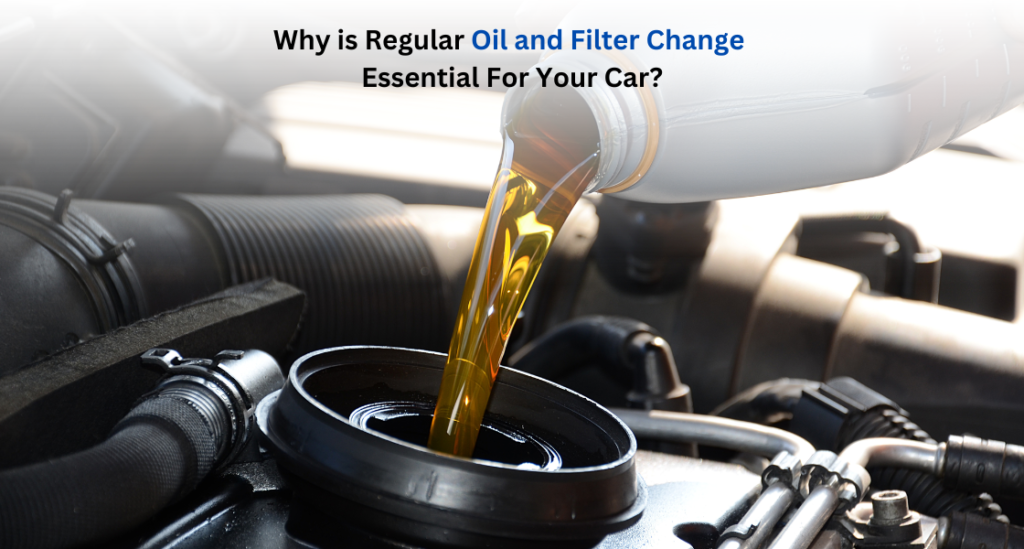Every car owner must prioritize regular maintenance including oil and filter change.
Periodic maintenance is crucial for maintaining your car’s performance, safety, and durability. A well-functioning engine ensures optimal fuel efficiency and reduced emissions.
Find below more about oil and filter change.
Table of Contents
ToggleWhy is Engine Oil Important?
Engine oil plays a major role in ensuring your vehicle’s engine operates smoothly and efficiently. It serves multiple functions, including lubrication, cooling, cleaning, and protection of engine components.
Find below the various benefits of engine oil:
- Lubrication
Engine oil’s primary function is to lubricate the moving parts of the engine. The internal components of an engine, such as pistons, crankshafts, and camshafts, are in constant motion and generate a significant amount of friction.
Without proper lubrication, this friction can cause the components to wear out prematurely, leading to costly repairs or even engine failure. Oil creates a thin film between these moving parts, reducing friction and preventing excessive wear.
- Cooling
In addition to lubrication, engine oil also helps to dissipate heat generated by the engine. As the oil circulates through the engine, it absorbs heat from the components and carries it away to the oil pan, where it can cool down.
This process helps to maintain optimal engine temperature and prevents overheating, which can cause serious damage to the engine.
- Cleaning
Over time, engines accumulate dirt, debris, and sludge from combustion by-products and external contaminants. Engine oil contains additives that help to suspend these particles and keep them from settling on engine components.
As the oil circulates, it carries these contaminants to the oil filter, where they are trapped and removed from the system. This cleaning action helps to maintain engine cleanliness and efficiency.
- Protection
Engine oil also provides a protective barrier against corrosion and rust. Modern engine oils contain additives that form a protective coating on engine components, preventing the formation of rust and corrosion.
This protection is especially important for vehicles that are not used frequently or are exposed to harsh environmental conditions.
What is the Role of the Oil Filter?
The oil filter is an integral component of the engine’s lubrication system. Its primary function is to remove contaminants from the engine oil, ensuring that only clean oil circulates through the engine.
Find below the various benefits of oil filter:
- Removing Contaminants
Engine oil carries dirt, debris, and sludge away from engine components. The oil filter traps these contaminants, preventing them from circulating back into the engine.
Over time, the filter becomes clogged with particles, reducing its effectiveness. Regularly replacing the oil filter ensures that it can continue to perform its function effectively, maintaining clean oil and protecting the engine.
- Preventing Engine Damage
A clogged oil filter can restrict oil flow, reducing lubrication and increasing the risk of engine damage. In severe cases, it can cause oil starvation, where the engine components do not receive enough oil to function properly. This can lead to increased friction, overheating, and ultimately, engine failure.
Regularly changing the oil filter helps to maintain proper oil flow and prevent engine damage.
The Benefits of Regular Oil and Filter Change
Regular oil and filter change offer numerous benefits, contributing to the longevity and performance of your vehicle, including:
- Enhanced Engine Performance
Fresh engine oil and a clean oil filter ensure that your car engine operates smoothly and efficiently. By reducing friction and wear, maintaining optimal temperature, and preventing contamination, regular oil changes help to enhance engine performance. A well-lubricated engine runs more efficiently, providing better acceleration, fuel economy, and overall driving experience.
- Prolonged Engine Life
Regular oil and filter changes are crucial for extending the life of your engine. By maintaining proper lubrication, cooling, and cleaning, these routine procedures help to prevent premature wear and tear, reducing the risk of costly repairs and engine failure. A well-maintained engine can provide reliable performance for many years, extending the lifespan of your vehicle.
- Improved Fuel Efficiency
A clean and well-lubricated engine operates more efficiently, consuming less fuel. Dirty or contaminated oil can cause increased friction and resistance, leading to higher fuel consumption. Regular oil changes help to maintain optimal engine efficiency, improving fuel economy and reducing the frequency of trips to the gas station.
- Reduced Emissions
Old or contaminated oil can cause incomplete combustion, resulting in higher emissions of harmful pollutants. Regular oil changes help to maintain clean oil and proper engine function, reducing emissions and contributing to a cleaner environment.
- Cost Savings
While regular oil and filter change can save you significant costs in the long run. Preventive maintenance helps to avoid major engine repairs and replacements, which can be far more expensive than routine oil changes. By keeping your engine in top condition, you can also reduce the likelihood of unexpected breakdowns and the associated costs of towing and repairs.
When to Schedule Oil and Filter Change?
The frequency of oil and filter change depends on several factors, including the type of oil used, driving conditions, and manufacturer recommendations.
Find below some general guidelines for oil and filter change:
- Follow Manufacturer Recommendations
Your vehicle’s owner manual provides specific recommendations for oil change intervals based on the make and model. These guidelines are tailored to your vehicle’s engine and should be followed to ensure optimal performance and longevity.
However, most manufacturers recommend changing the oil every 3,000 to 5,000 miles for conventional oil and every 7,500 to 10,000 miles for synthetic oil.
- Consider Driving Conditions
Driving conditions can also impact the frequency of oil changes. If you frequently drive in extreme temperatures, dusty environments, or heavy traffic, you may need to change your oil more often. Short trips and stop-and-go driving can also cause oil to degrade faster, necessitating more frequent changes.
- Monitor Oil Quality
Regularly checking your engine oil’s condition can help you determine when it needs to be changed. If the oil appears dark, dirty or has a burnt smell, it’s time for a change. Additionally, if you notice any changes in engine performance, such as unusual noises or reduced fuel efficiency, it may indicate that the oil needs to be replaced.
Regular oil and filter change are essential for maintaining your vehicle’s performance, efficiency, and longevity. Invest in regular servicing to enjoy a smoother, more efficient, and reliable driving experience while protecting your engine from premature wear and damage.
Auto Car Repair Expert Car Service
The multi-brand car service center offers a wide range of car repair and maintenance services. Their expert technicians have the experience and expertise to provide high-quality servicing. They further use the latest technology and equipment to ensure quality and safety.
Book your car service today at Auto Car Repair!
Visit Auto Car Repair Locations
Moti Nagar: 60 N G Road, Rama Rd, Moti Nagar, New Delhi, Delhi 110015
Okhla: G7JF+F87, Pocket W, Okhla Phase II, Okhla Industrial Estate, New Delhi, Delhi 110020
Noida: H-142, near Ananda Corporate Office, H Block, Sector 63, Noida, Uttar Pradesh 201301


